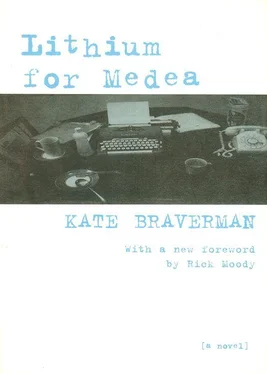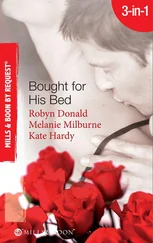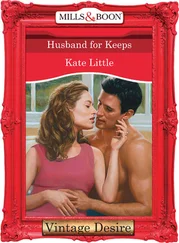“Jason, I’m bored by my contempt for you. My rage has scraped itself thin.” Thin as a gutted throat, my friend. Thin as my father’s sculpted hands, gray scab of the IV and bones poking through. “I want something else.”
“You always want something else. That’s your theme.” Jason looked at the ceiling.
I memorized the bones in his ribs, the curly reddish hairs on his thighs that seemed to be reaching out for something. Fragile man, emotional hemophiliac, too rare and delicate for this world. You must remain as you are, encased and oddly protected and exaggerated, exaggerated.
“I’m leaving.”
Jason leaned on one elbow. Skin pale as porcelain. A kind of statue. The last piece of hard evidence. He lit a cigarette. “I thought those boxes were significant. You folded things. It wasn’t like you.” Jason stared at me. “Isn’t this sudden?”
“I’ve been packed for weeks. My father has cancer. But he’s going to make it. By the way, I killed Picasso. I strangled him on the boardwalk. The waves buried him. It was a rite of propitiation. If you had come back that night, I might have killed you.”
“You better slow down,” Jason said. He sat up.
“I’m just beginning.” I walked to the door feeling absolutely sober and thinking, it’s possible to start over. A few equipment changes, no blinders, no bandages, a lot less weight. It’s possible. And madness is a storm like any other. It passes.
“You’re strung out,” Jason observed, somewhere behind me.
I was standing in his front room. His new paintings were hung on the walls. Floors disappeared into a tapestry of purple and yellow threads. Patches of skin were swallowed by patterns within shadows, their own dimension. The shadows looked as if they were moving, a kind of moth feeding, eating something at the edges. I heard the water in the fountain falling lazy, drunkenly, while goldfish flashed their fins, a series of swift orange fans, behind me.
“You’ll never make it,” Jason shouted.
I stood on his porch thinking, I have been loved by a madman. I am twenty-seven years old and know the best has already been. Then I closed the door behind me.
I zigzagged a path to my house. The Woman’s House. A duck swam below me, slow but purposeful. A gull shrieked and rushed back to the sea. Soon the peninsula would be a slow floating seal, enormous and dark. Soon the sky would lay a pink claw across the land, the corally gray sand. And madness is a storm like any other. It passes.
The sea breeze grew stronger. And wasn’t it talking? Wasn’t it saying, go, go. We are with you. We are your arms, your fuel. Go. Go. We are your sails, your current. If you decide to swim, we will be your gills.
I sensed the breeze tearing at the house like a chorus of voices, women’s voices. Women with kerchiefs chattering at a stream while they pounded clothing clean against rocks. A chorus in Polish and Yiddish. A stream of klulles, of dark winding curses. But no. They are smiling. They are saying, go, go. Do what we would have done had we known the world was round, had we known it possible, had we maps, the power of navigation, a few equipment changes, hope and the key to the ball and chain.
It was night. I turned on the kitchen light. I found a pad of paper and a pen.
Early Spring
Dear Rachel,
There is much to say and time is a cymbal crashing. And time is a disk of brass banged periodically and forgotten. When we realize it’s getting late, it’s almost over.
I must tell you about our grandmother’s apartment. It bears the ruin of unrepaired living, of paint that peels, of streaked windows, stains from faulty plumbing. All of this, yes. But within her limits she keeps her two small rooms spotless, immaculate. Everything is polished. Her imitation cut crystal ashtrays perch on her always waxed secondhand tables. Her bright bouquets of plastic flowers are dusted. Her threadbare rugs are vacuumed. From the front door I smelled a faint trace of ammonia.
One entire wall of her living room is covered with memorabilia concerning us. She has tacked to the plaster the announcements our mothers sent of their marriages. She has tacked newspaper clippings she chanced to find about our mothers, yellowing slices of their careers. All the bits and pieces that have somehow drifted toward her across the decades. One Mother’s Day card, a bright red heart such as a child might make, hangs in the center of the wall surrounded by the announcements of my birth and yours.
A calendar with the dates of importance in our lives marked with black crayon is taped to her front door. A black X.
She explained that when she sees the day of a birth or an anniversary approaching, she takes the bus to a department store. She shoplifts a gift for us. It is the only time she ever steals.
And time is a cymbal crashing, crashing. When we realize we are mortal, we are already old. When we realize it is getting late, it’s nearly over.
The first thing Grandmother Rose did was give me my gifts. I noticed the piles of oddly wrapped objects stacked along the wall beneath the child’s red heart. The paper heart was a kind of eye in the wall and the wrapped stack of gifts a kind of altar. There were four such stacks.
I cannot really call the gifts wrapped. You must understand that she stole these things. Often she simply tucked them away in strips of old newspaper with string tied in a bow around them. I sat at her tiny kitchen table and began unwrapping my gifts. They were stacked in order. I began with my baby gifts, a silk hat lined with lace ruffles, a pair of infant’s sky-blue mittens, a pink starched-looking cotton pinafore.
I was sitting at the table in her tiny kitchen, in the same kitchen where our mothers sat when they came on subways from the orphanage on Sundays and showed her geography in books of maps they stole from libraries for her. I opened each gift slowly. A little girl’s change purse, a compact with my initials carved on the glittery surface, a scarf with bluish flowers stamped onto the cheap cotton and an apron imprinted with strawberries and daisies that looked somehow fresh, impossibly sunny.
My fingers began to feel haunted. Everything I touched smelled of her, smelled somehow pink and perfumed and broken. And I know even now, completely crippled, when she notices the approach of a birthday she will manage to climb down her six steep flights of stairs and make her painful way to a department store to grab a scarf or compact. And if it is a good day, without ice or rain or wind, she will stop in a dime store and buy a sheet of birthday wrapping paper. Then the new object will join the others in one of the four waiting stacks.
I saw twenty years of birthdays on the table in front of me. A progression, a chronology, a complete history from infancy through girlhood, womanhood. The later gifts were tokens for a house. Place mats with dancing yellow flowers and matching napkins, potholders, a ladle with a long wooden handle. “For your house,” Grandmother Rose said. “For your husband?”
We sat in silence after the opening of the gifts. She explained that the other gifts were for her daughters and you. And I breathed in her smell, something pink and somehow broken and tinged with ammonia.
“I have more things for you,” Grandmother Rose said.
Night fell like a black fist. Even the sky seemed to be holding its breath. She sat near me, hunched up, yes, and almost blind, with a cane. I had a sense of something black dancing in her eyes. And I was afraid.
I started to speak. “Not yet,” she cautioned. And I sat in my assigned seat in her tiny kitchen watching the darkness thickening in the room and waiting, my pile of gifts on the table in front of me and an aroma of grief radiating from the cotton threads of apron and potholders and kerchiefs.
Читать дальше












